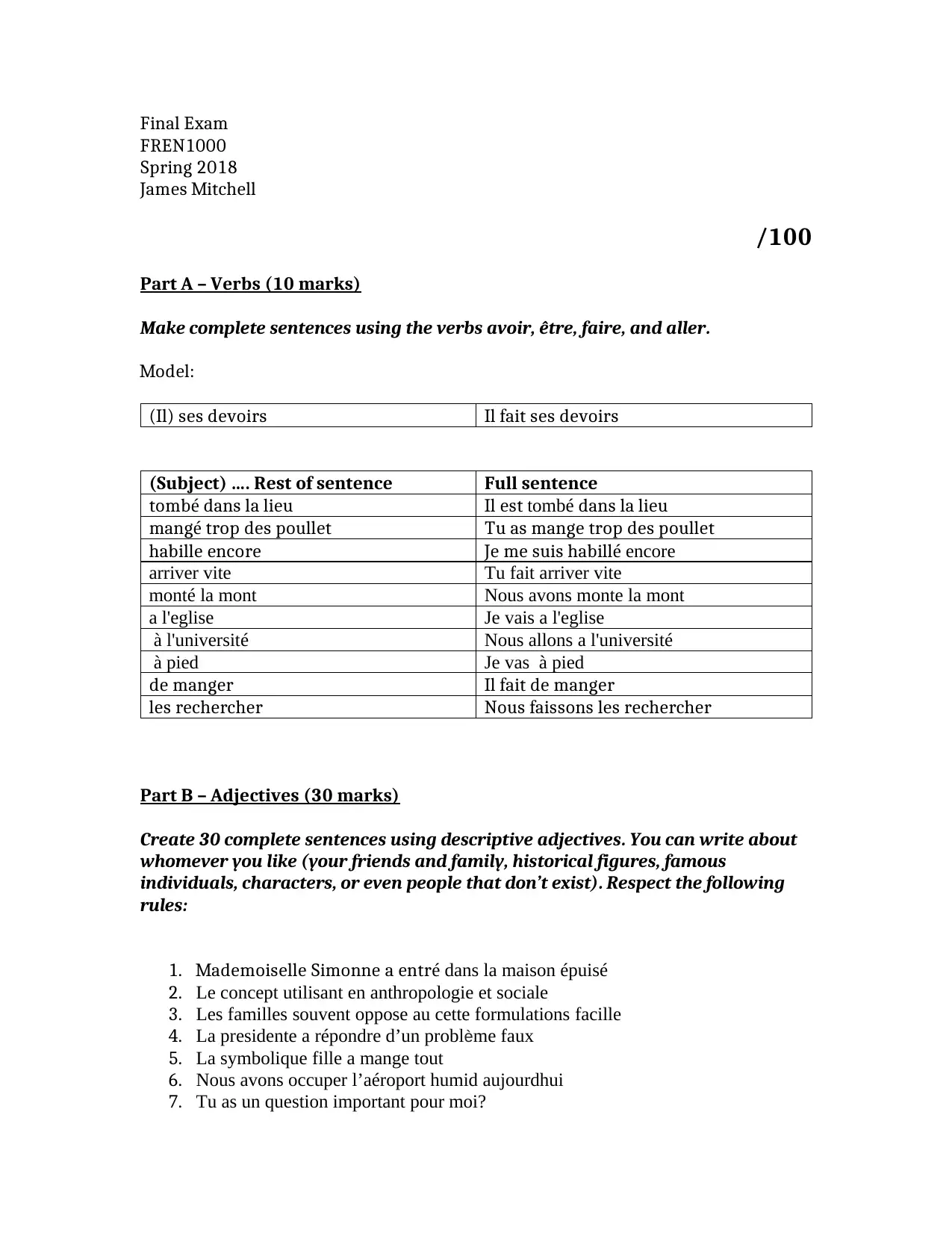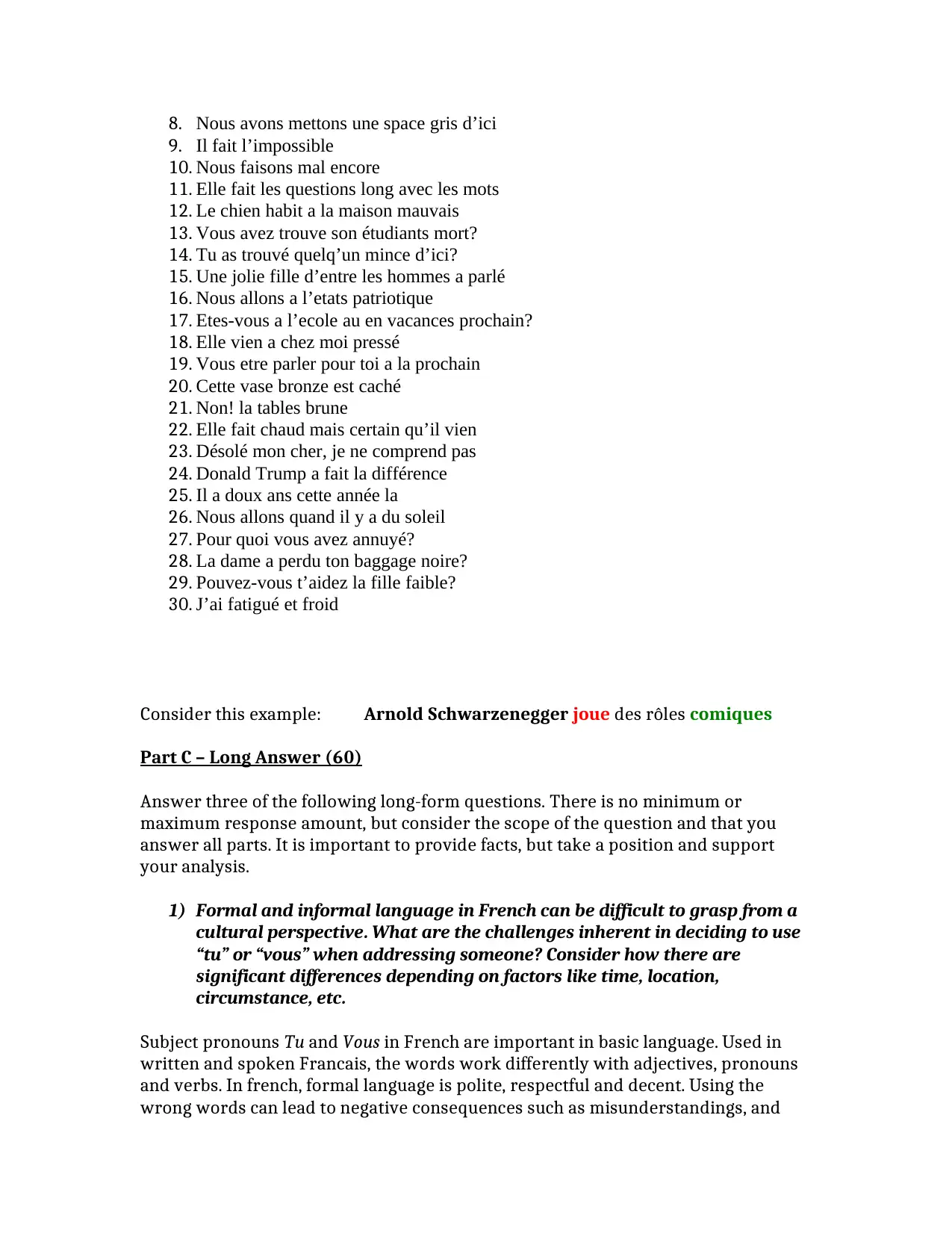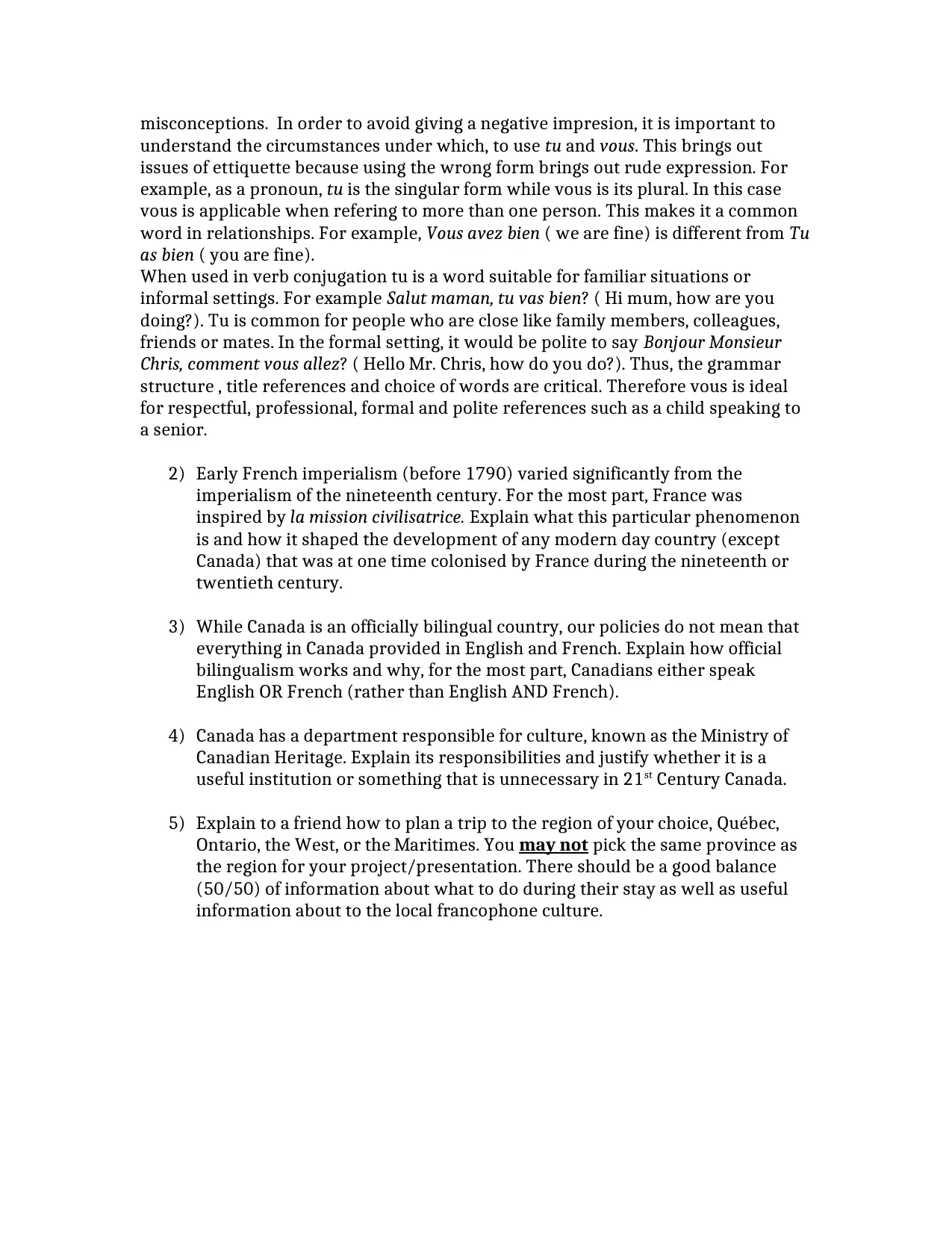French Final Exam Spring 2018
VerifiedAdded on 2023/06/08
|3
|1097
|94
AI Summary
This is a French final exam paper for Spring 2018 with three parts - Verbs, Adjectives and Long-form questions. The Verbs section requires the use of avoir, être, faire, and aller to make complete sentences. The Adjectives section requires the creation of 30 complete sentences using descriptive adjectives. The Long-form questions section has five questions, out of which three need to be answered. The questions cover topics such as formal and informal language in French, early French imperialism, official bilingualism in Canada, and the Ministry of Canadian Heritage. The paper is suitable for students of FREN1000 at James Mitchell college.
Contribute Materials
Your contribution can guide someone’s learning journey. Share your
documents today.

Final Exam
FREN1000
Spring 2018
James Mitchell
/100
Part A – Verbs (10 marks)
Make complete sentences using the verbs avoir, être, faire, and aller.
Model:
(Il) ses devoirs Il fait ses devoirs
(Subject) …. Rest of sentence Full sentence
tombé dans la lieu Il est tombé dans la lieu
mangé trop des poullet Tu as mange trop des poullet
habille encore Je me suis habillé encore
arriver vite Tu fait arriver vite
monté la mont Nous avons monte la mont
a l'eglise Je vais a l'eglise
à l'université Nous allons a l'université
à pied Je vas à pied
de manger Il fait de manger
les rechercher Nous faissons les rechercher
Part B – Adjectives (30 marks)
Create 30 complete sentences using descriptive adjectives. You can write about
whomever you like (your friends and family, historical figures, famous
individuals, characters, or even people that don’t exist). Respect the following
rules:
1. Mademoiselle Simonne a entré dans la maison épuisé
2. Le concept utilisant en anthropologie et sociale
3. Les familles souvent oppose au cette formulations facille
4. La presidente a répondre d’un problème faux
5. La symbolique fille a mange tout
6. Nous avons occuper l’aéroport humid aujourdhui
7. Tu as un question important pour moi?
FREN1000
Spring 2018
James Mitchell
/100
Part A – Verbs (10 marks)
Make complete sentences using the verbs avoir, être, faire, and aller.
Model:
(Il) ses devoirs Il fait ses devoirs
(Subject) …. Rest of sentence Full sentence
tombé dans la lieu Il est tombé dans la lieu
mangé trop des poullet Tu as mange trop des poullet
habille encore Je me suis habillé encore
arriver vite Tu fait arriver vite
monté la mont Nous avons monte la mont
a l'eglise Je vais a l'eglise
à l'université Nous allons a l'université
à pied Je vas à pied
de manger Il fait de manger
les rechercher Nous faissons les rechercher
Part B – Adjectives (30 marks)
Create 30 complete sentences using descriptive adjectives. You can write about
whomever you like (your friends and family, historical figures, famous
individuals, characters, or even people that don’t exist). Respect the following
rules:
1. Mademoiselle Simonne a entré dans la maison épuisé
2. Le concept utilisant en anthropologie et sociale
3. Les familles souvent oppose au cette formulations facille
4. La presidente a répondre d’un problème faux
5. La symbolique fille a mange tout
6. Nous avons occuper l’aéroport humid aujourdhui
7. Tu as un question important pour moi?
Secure Best Marks with AI Grader
Need help grading? Try our AI Grader for instant feedback on your assignments.

8. Nous avons mettons une space gris d’ici
9. Il fait l’impossible
10. Nous faisons mal encore
11. Elle fait les questions long avec les mots
12. Le chien habit a la maison mauvais
13. Vous avez trouve son étudiants mort?
14. Tu as trouvé quelq’un mince d’ici?
15. Une jolie fille d’entre les hommes a parlé
16. Nous allons a l’etats patriotique
17. Etes-vous a l’ecole au en vacances prochain?
18. Elle vien a chez moi pressé
19. Vous etre parler pour toi a la prochain
20. Cette vase bronze est caché
21. Non! la tables brune
22. Elle fait chaud mais certain qu’il vien
23. Désolé mon cher, je ne comprend pas
24. Donald Trump a fait la différence
25. Il a doux ans cette année la
26. Nous allons quand il y a du soleil
27. Pour quoi vous avez annuyé?
28. La dame a perdu ton baggage noire?
29. Pouvez-vous t’aidez la fille faible?
30. J’ai fatigué et froid
Consider this example: Arnold Schwarzenegger joue des rôles comiques
Part C – Long Answer (60)
Answer three of the following long-form questions. There is no minimum or
maximum response amount, but consider the scope of the question and that you
answer all parts. It is important to provide facts, but take a position and support
your analysis.
1) Formal and informal language in French can be difficult to grasp from a
cultural perspective. What are the challenges inherent in deciding to use
“tu” or “vous” when addressing someone? Consider how there are
significant differences depending on factors like time, location,
circumstance, etc.
Subject pronouns Tu and Vous in French are important in basic language. Used in
written and spoken Francais, the words work differently with adjectives, pronouns
and verbs. In french, formal language is polite, respectful and decent. Using the
wrong words can lead to negative consequences such as misunderstandings, and
9. Il fait l’impossible
10. Nous faisons mal encore
11. Elle fait les questions long avec les mots
12. Le chien habit a la maison mauvais
13. Vous avez trouve son étudiants mort?
14. Tu as trouvé quelq’un mince d’ici?
15. Une jolie fille d’entre les hommes a parlé
16. Nous allons a l’etats patriotique
17. Etes-vous a l’ecole au en vacances prochain?
18. Elle vien a chez moi pressé
19. Vous etre parler pour toi a la prochain
20. Cette vase bronze est caché
21. Non! la tables brune
22. Elle fait chaud mais certain qu’il vien
23. Désolé mon cher, je ne comprend pas
24. Donald Trump a fait la différence
25. Il a doux ans cette année la
26. Nous allons quand il y a du soleil
27. Pour quoi vous avez annuyé?
28. La dame a perdu ton baggage noire?
29. Pouvez-vous t’aidez la fille faible?
30. J’ai fatigué et froid
Consider this example: Arnold Schwarzenegger joue des rôles comiques
Part C – Long Answer (60)
Answer three of the following long-form questions. There is no minimum or
maximum response amount, but consider the scope of the question and that you
answer all parts. It is important to provide facts, but take a position and support
your analysis.
1) Formal and informal language in French can be difficult to grasp from a
cultural perspective. What are the challenges inherent in deciding to use
“tu” or “vous” when addressing someone? Consider how there are
significant differences depending on factors like time, location,
circumstance, etc.
Subject pronouns Tu and Vous in French are important in basic language. Used in
written and spoken Francais, the words work differently with adjectives, pronouns
and verbs. In french, formal language is polite, respectful and decent. Using the
wrong words can lead to negative consequences such as misunderstandings, and

misconceptions. In order to avoid giving a negative impresion, it is important to
understand the circumstances under which, to use tu and vous. This brings out
issues of ettiquette because using the wrong form brings out rude expression. For
example, as a pronoun, tu is the singular form while vous is its plural. In this case
vous is applicable when refering to more than one person. This makes it a common
word in relationships. For example, Vous avez bien ( we are fine) is different from Tu
as bien ( you are fine).
When used in verb conjugation tu is a word suitable for familiar situations or
informal settings. For example Salut maman, tu vas bien? ( Hi mum, how are you
doing?). Tu is common for people who are close like family members, colleagues,
friends or mates. In the formal setting, it would be polite to say Bonjour Monsieur
Chris, comment vous allez? ( Hello Mr. Chris, how do you do?). Thus, the grammar
structure , title references and choice of words are critical. Therefore vous is ideal
for respectful, professional, formal and polite references such as a child speaking to
a senior.
2) Early French imperialism (before 1790) varied significantly from the
imperialism of the nineteenth century. For the most part, France was
inspired by la mission civilisatrice. Explain what this particular phenomenon
is and how it shaped the development of any modern day country (except
Canada) that was at one time colonised by France during the nineteenth or
twentieth century.
3) While Canada is an officially bilingual country, our policies do not mean that
everything in Canada provided in English and French. Explain how official
bilingualism works and why, for the most part, Canadians either speak
English OR French (rather than English AND French).
4) Canada has a department responsible for culture, known as the Ministry of
Canadian Heritage. Explain its responsibilities and justify whether it is a
useful institution or something that is unnecessary in 21st Century Canada.
5) Explain to a friend how to plan a trip to the region of your choice, Québec,
Ontario, the West, or the Maritimes. You may not pick the same province as
the region for your project/presentation. There should be a good balance
(50/50) of information about what to do during their stay as well as useful
information about to the local francophone culture.
understand the circumstances under which, to use tu and vous. This brings out
issues of ettiquette because using the wrong form brings out rude expression. For
example, as a pronoun, tu is the singular form while vous is its plural. In this case
vous is applicable when refering to more than one person. This makes it a common
word in relationships. For example, Vous avez bien ( we are fine) is different from Tu
as bien ( you are fine).
When used in verb conjugation tu is a word suitable for familiar situations or
informal settings. For example Salut maman, tu vas bien? ( Hi mum, how are you
doing?). Tu is common for people who are close like family members, colleagues,
friends or mates. In the formal setting, it would be polite to say Bonjour Monsieur
Chris, comment vous allez? ( Hello Mr. Chris, how do you do?). Thus, the grammar
structure , title references and choice of words are critical. Therefore vous is ideal
for respectful, professional, formal and polite references such as a child speaking to
a senior.
2) Early French imperialism (before 1790) varied significantly from the
imperialism of the nineteenth century. For the most part, France was
inspired by la mission civilisatrice. Explain what this particular phenomenon
is and how it shaped the development of any modern day country (except
Canada) that was at one time colonised by France during the nineteenth or
twentieth century.
3) While Canada is an officially bilingual country, our policies do not mean that
everything in Canada provided in English and French. Explain how official
bilingualism works and why, for the most part, Canadians either speak
English OR French (rather than English AND French).
4) Canada has a department responsible for culture, known as the Ministry of
Canadian Heritage. Explain its responsibilities and justify whether it is a
useful institution or something that is unnecessary in 21st Century Canada.
5) Explain to a friend how to plan a trip to the region of your choice, Québec,
Ontario, the West, or the Maritimes. You may not pick the same province as
the region for your project/presentation. There should be a good balance
(50/50) of information about what to do during their stay as well as useful
information about to the local francophone culture.
1 out of 3
Your All-in-One AI-Powered Toolkit for Academic Success.
+13062052269
info@desklib.com
Available 24*7 on WhatsApp / Email
![[object Object]](/_next/static/media/star-bottom.7253800d.svg)
Unlock your academic potential
© 2024 | Zucol Services PVT LTD | All rights reserved.